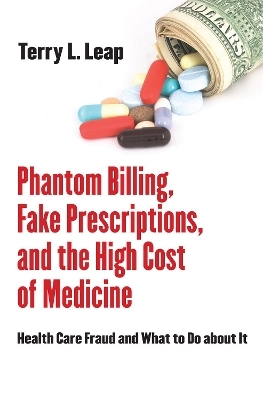
Phantom Billing, Fake Prescriptions, and the High Cost of Medicine
Health Care Fraud and What to Do about It
Seiten
2011
Ilr Press (Verlag)
978-0-8014-4979-6 (ISBN)
Ilr Press (Verlag)
978-0-8014-4979-6 (ISBN)
- Lieferbar (Termin unbekannt)
- Versandkostenfrei innerhalb Deutschlands
- Auch auf Rechnung
- Verfügbarkeit in der Filiale vor Ort prüfen
- Artikel merken
Confronting medical fraud and its economic, psychological, and social costs.
U.S. health care is a $2.5 trillion system that accounts for more than 17 percent of the nation’s GDP. It is also highly susceptible to fraud. Estimates vary, but some observers believe that as much as 10 percent of all medical billing involves some type of fraud. In 2009, New York’s Medicaid fraud office recovered $283 million and obtained 148 criminal convictions. In July 2010, the U.S. Justice Department charged nearly 100 patients, doctors, and health care executives in five states of bilking the Medicare system out of more than $251 million through false claims for services that were medically unnecessary or never provided. These cases only hint at the scope of the problem.
In Phantom Billing, Fake Prescriptions, and the High Cost of Medicine, Terry L. Leap takes on medical fraud and its economic, psychological, and social costs. Illustrated throughout with dozens of specific and often fascinating cases, this book covers a wide variety of crimes: kickbacks, illicit referrals, overcharging and double billing, upcoding, unbundling, rent-a-patient and pill-mill schemes, insurance scams, short-pilling, off-label marketing of pharmaceuticals, and rebate fraud, as well as criminal acts that enable this fraud (mail and wire fraud, conspiracy, and money laundering). After assessing the effectiveness of the federal laws designed to fight health care fraud and abuse—the antikickback statute, the Stark Law, the False Claims Act, HIPAA, and the food and drug laws—Leap suggests a number of ways that health care providers, consumers, insurers, and federal and state officials can bring health care fraud and abuse under control, thereby reducing the overall cost of medical care in America.
U.S. health care is a $2.5 trillion system that accounts for more than 17 percent of the nation’s GDP. It is also highly susceptible to fraud. Estimates vary, but some observers believe that as much as 10 percent of all medical billing involves some type of fraud. In 2009, New York’s Medicaid fraud office recovered $283 million and obtained 148 criminal convictions. In July 2010, the U.S. Justice Department charged nearly 100 patients, doctors, and health care executives in five states of bilking the Medicare system out of more than $251 million through false claims for services that were medically unnecessary or never provided. These cases only hint at the scope of the problem.
In Phantom Billing, Fake Prescriptions, and the High Cost of Medicine, Terry L. Leap takes on medical fraud and its economic, psychological, and social costs. Illustrated throughout with dozens of specific and often fascinating cases, this book covers a wide variety of crimes: kickbacks, illicit referrals, overcharging and double billing, upcoding, unbundling, rent-a-patient and pill-mill schemes, insurance scams, short-pilling, off-label marketing of pharmaceuticals, and rebate fraud, as well as criminal acts that enable this fraud (mail and wire fraud, conspiracy, and money laundering). After assessing the effectiveness of the federal laws designed to fight health care fraud and abuse—the antikickback statute, the Stark Law, the False Claims Act, HIPAA, and the food and drug laws—Leap suggests a number of ways that health care providers, consumers, insurers, and federal and state officials can bring health care fraud and abuse under control, thereby reducing the overall cost of medical care in America.
Terry L. Leap is Lawson Professor of Business and Head of the Department of Management, University of Tennessee-Knoxville. He is the author of Dishonest Dollars, and two textbooks.
Introduction: The Big Picture
1. Health Care Fraud and Its Facilitating Crimes
2. The Major Health Care Fraud Laws
3. Fraud in Fee-for-Service and Managed Care: Different Sides of the Same Coin
4. Fraud at Major Hospitals: Profits at Any Cost, Part 1
5. Fraud in the Pharmaceutical, Medical Equipment, and Supply Industries: Profits at Any Cost, Part 2
6. Fighting Health Care Fraud and Abuse
ConclusionAppendix: A Note on the Major U.S. Public Insurance Programs
Notes
References
Index
| Reihe/Serie | The Culture and Politics of Health Care Work |
|---|---|
| Verlagsort | New York |
| Sprache | englisch |
| Maße | 155 x 235 mm |
| Gewicht | 907 g |
| Themenwelt | Literatur ► Biografien / Erfahrungsberichte |
| Medizin / Pharmazie ► Gesundheitswesen | |
| Recht / Steuern ► EU / Internationales Recht | |
| Recht / Steuern ► Strafrecht ► Besonderes Strafrecht | |
| Wirtschaft ► Betriebswirtschaft / Management | |
| ISBN-10 | 0-8014-4979-0 / 0801449790 |
| ISBN-13 | 978-0-8014-4979-6 / 9780801449796 |
| Zustand | Neuware |
| Haben Sie eine Frage zum Produkt? |
Mehr entdecken
aus dem Bereich
aus dem Bereich
eine praxisorientierte Darstellung
Buch | Softcover (2024)
C.H.Beck (Verlag)
69,00 €


